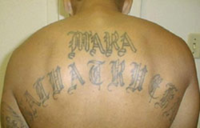
Photo from wikipedia
Abstract This article problematizes the role of the interview as a methodological strategy that loses its easy replication when employed in studies with undocumented youth. We raise questions about the… Click to show full abstract
Abstract This article problematizes the role of the interview as a methodological strategy that loses its easy replication when employed in studies with undocumented youth. We raise questions about the contingencies of conducting qualitative interviews with undocumented youth – what does it mean leverage the interview-event as a space of healing for them? What does it mean to recognize, or potentially mis-recognize one’s identity in the context of a research interview? How might inquiry function in exploring the uncertainties of an avowed identity and contribute not to normalization but to healing and justice? To engage such questions, we specifically examine the implications of interview practices as a dangerous (and productive) site where concerns of confession entangle with the potential for avowal as a resistive participatory practice. This paper argues that the confessional interview offers a moment of advocacy and healing through the avowal of their experience occupying undocumented identities.
Journal Title: International Journal of Qualitative Studies in Education
Year Published: 2021
Link to full text (if available)
Share on Social Media: Sign Up to like & get
recommendations!